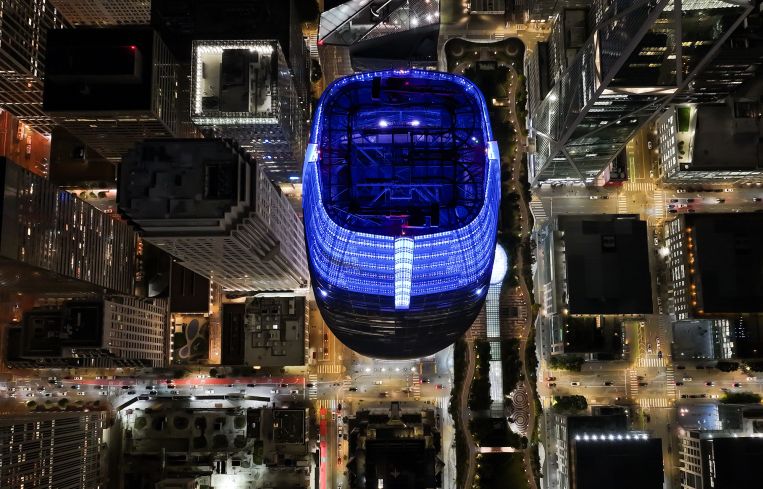AI Firms Continue to Boost San Francisco’s Office Market — a Lot
A new report predicts the companies will take an additional 16 million square feet between now and 2030
By Patrick Sisson May 22, 2025 9:45 am
reprints
Nothing artificial about this: Office space demand by well-capitalized AI startups has helped bring San Francisco’s ailing post-COVID real estate market back from the brink.
A new CBRE analysis exploring how this ongoing tech cycle compares to past booms offers plenty of confidence in artificial intelligence’s lasting impact, albeit with some less pronounced impacts on the office market.
CBRE predicts that after leasing more than 5 million square feet in the city of San Francisco over the last five years, AI-driven firms will likely take an additional 16 million square feet between now and 2030 — or roughly 2.7 million square feet annually. That would reduce the city’s sky-high office vacancy rate from 35.8 percent at the start of 2025 to less than 18 percent, if current levels of taking newly available space off the market remain steady.
Steady, persistent demand growth will potentially pay big dividends to local office landlords. The Bay Area already boasts more than 800 generative AI firms.
“Most of these AI companies are in the office four, five or six days of the week, and, like the mobile and app economy companies pre-pandemic, will have an impact and draw more people to the office on a regular basis,” said Colin Yasukochi, executive director of CBRE’s Tech Insights Center. “This will create more of an office culture and bring more people into Downtown.”
But the continuing AI boom won’t be as transformative as the mobile app and social media era, when new tech firms like Airbnb and Uber took a total of 31 million square feet between 2008 and 2019. Yasukochi said that due to the extreme push for headcount growth in mobile app companies and their propensity to go public, they simply consumed real estate in greater quantities. That isn’t as likely to happen with AI-era tech companies.
AI itself is partially to blame. CBRE estimates that AI firms will only take 50 to 75 percent of the office space, in part because AI will make firms more efficient, reducing the demand for headcount and office space. AI firms also have decidedly more physical infrastructure to invest in. Of the $239 billion in venture capital the industry received between 2020 and the start of 2025, much was spent on data center buildouts.
CBRE completed its analysis after a run of high-profile leases in recent months raised questions about the sustainability of the industry, how large it could get and how property owners and AI firms might want to strategize around space needs and competition for space.
The AI leasing surge of the last two years has seen a spate of big deals and repeat expansions from rapidly expanding startups. Recent ones include workforce management company Rippling, which leased 123,000 square feet at the Union Bank building at Downtown’s 430 California Street in April 2024 for its 500 or so employees. “We’ve signed a new lease in San Francisco that will enable us to keep building and growing in one of the world’s best cities for innovation,” Rippling said on X.
In March this year, Tools for Humanity, a Sam Altman-backed firm, took over all 87,000 square feet of 600 Townsend Street East. In addition, Databricks moved into Barker Pacific Group’s 1 Sansome Street this spring, doubling its footprint, and announced a $1 billion commitment to expand its San Francisco operations over the next three years.
“San Francisco remains a global epicenter for AI innovation and talent, making it an ideal location for our continued growth,” Patrick Wendell, co-founder and vice president of engineering at Databricks, said in a statement to Commercial Observer. “Our new, state-of-the-art headquarters spans 150,000 square feet, and we plan to expand further as we aim to more than double our current employee footprint in San Francisco over the next two years.”
Leading companies like Sierra AI added additional space, taking another floor at 235 Second Street, and Christine Yuen, senior vice president of leasing for owner BXP, claims OpenAI and competitor Anthropic are actively searching for more office space.
Another important difference between the AI and mobile app eras remains competition. Where mobile apps exploded in growth at a time when the previous era of dot-com firms had largely faded away, AI firms currently compete with established tech giants for top-tier, Class A offices. Pure play AI won’t grow as large simply because of supply constraints on that tier of office space.
While the industry will remain geographically distributed, San Francisco will remain the AI hub for the foreseeable future, according to CBRE; $103 billion of the total national AI investment over the last five years went to Bay Area firms. And, while AI won’t take nearly as much office space as firms from the previous tech era needed — or San Francisco office landlords want — it will ideally catalyze more growth and economic activity in the surrounding region. Every industry is currently focused on integrating AI into their products, services and workflows.
“There’s other companies that could be created that are going to build some product or service that’s built upon ChatGPT or Anthropic,” said Yasukochi.



